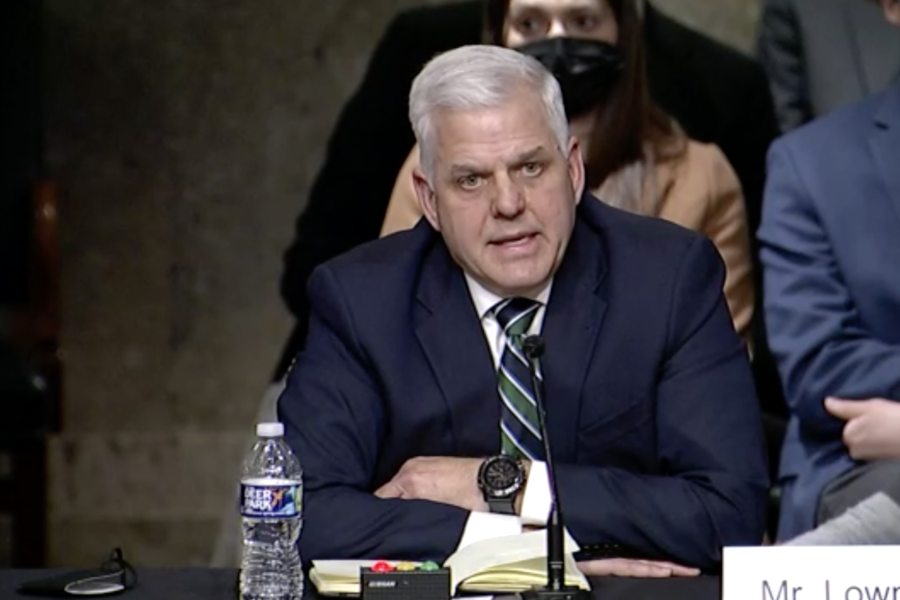As the Air Force looks to boost its aging aircraft’s mission capable rates and to control sustainment costs, the Defense Department should encourage the service to take full advantage of the secondhand market for parts, the nominee to lead the Pentagon’s sustainment enterprise told Congress on Feb. 15.
Christopher Lowman, nominated to serve as assistant secretary of defense for sustainment, told the Senate Armed Services Committee during his confirmation hearing that “used serviceable material,” or USM, which includes everything from engine parts to avionics systems, could be part of “addressing supply chain risk and building resilience” for the Air Force fleet.
Lowman’s comments were prompted by a question from Sen. Tammy Duckworth (D-Ill.), who noted that the Pentagon already has a used serviceable material program, whereby the Federal Aviation Administration provides the DOD with parts from Boeing’s 737 and 767 aircraft. The Air Force’s C-40 Clipper and KC-46 Pegasus are based off those planes, respectively.
The USM program’s savings are projected at $1.5 billion over the next seven years, Duckworth claimed. But it is not standardized and, in some cases, is harder to use than more costly options, she added.
“I’ve seen reports where purchasing officers have a program … function on their keyboard F7, where they just hit a function and it populates a form and they can buy brand new parts. But it is multi steps to use this program that exists for used parts,” Duckworth said, asking Lowman how he would incentivize or even require offices to use the USM program.
USM programs are nothing new in the commercial sector, Lowman noted. Indeed, the market accounts for billions of dollars, and observers have predicted the COVID-19 pandemic could lead to a surge in secondhand spare parts available.
The Air Force and the other services should be free to pursue that market, Lowman said.
“If confirmed, I’ll work closely with the services … to make sure there are no policy barriers to use of the USM,” said Lowman. “And I would work with the interagency community, in particular the FAA, to make sure that the necessary airworthiness documentation is available to guarantee the life of the part—the repair history, for example; the hours currently consumed by that particular part. So I look forward to taking this on.”
Lawmakers in Congress have become increasingly concerned about the cost of spare parts, as programs such as the F-35 and KC-46 have run into issues with sustainment that have cost tens of millions of dollars.
Sustainment of legacy fleets, meanwhile, has become a contentious topic at the Pentagon and in Congress as the Air Force looks to retire older aircraft and take the money used to keep them flying to procure new systems. Observers have noted, though, that this may result in a short-term decrease in readiness, with Duckworth expressing particular concern about the service’s airlift capabilities.
“It’s really a balance … between modernization and sustainment, and the need to appropriately allocate the resources to sustain our current capabilities, especially in the inter- and intra-theater lift, as you noted, but also to modernize those fleets in a sustainable fashion over time,” Lowman said.
“The second balance … is the balance across the Active and reserve components, to make sure that the resources the reserve components need to sustain their fleets [are available], and that they have the sufficient lift capability built into the [combatant command] logistics plans, so that the Department not only sustains the lift capability that they need, but also modernizes that over time.”
UCMJ Changes
Also during the Feb. 15 confirmation hearing, the nominee to become the Air Force’s top lawyer pledged to review staffing levels to ensure the Department of the Air Force has enough people and resources for its special victims office.
Peter J. Beshar, nominated to be general counsel for the DAF, made that commitment after being prompted by questioning from Sen. Kirsten Gillibrand (D-N.Y.). Gillibrand noted a 2020 DOD inspector general report that found that the Air Force had assigned special victim-certified prosecutors to six percent of eligible cases, “by far the lowest among the services,” she said.
“Fostering a culture of integrity and inclusion within the department is extraordinarily important. I think that diversity is what makes the Armed Forces the greatest in the world. I am not familiar in my current position outside of government with the level of staffing, but certainly trying to have a number of qualified investigators able to look into those types of matters would be important, and if confirmed, I would work toward that goal,” Beshar told Gillibrand.
Earlier in the hearing, Beshar seemed to agree with comments from Sen. Jim Inhofe (R-Okla.), who noted that recent reforms to the Uniform Code of Military Justice, which takes the decision to prosecute certain crimes like sexual assault out of the chain of command, will take time to implement. The 2022 National Defense Authorization Act gives the Pentagon two years to enact those changes.
“The changes that the Congress [has] approved, taking specific crimes out of the chain of command, as well as the IRC recommendations that have been embraced by the Department of Defense, are substantial undertakings, and they’re going to require really sustained commitment from military commanders across the field, as well as the other senior leaders within the organization,” Beshar said. “And so the goal is to get it right, naturally, and if confirmed, that’s what I would try to do.”
Inhofe added, “And to get it right, it does take time, sometimes.”
